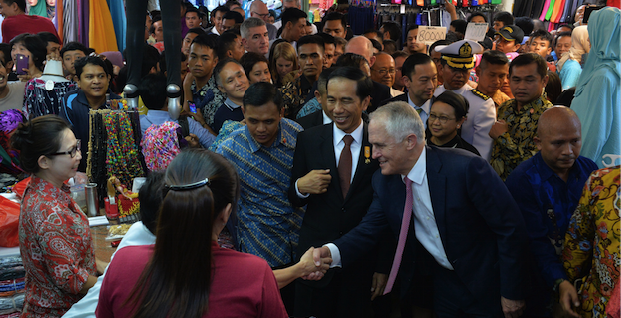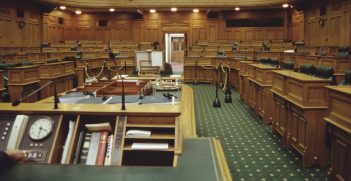A Roadmap for Australian Foreign and Trade Policy

Prime Minister Malcolm Turnbull has said it is an exciting time for Australia. Indeed, it is a period of great opportunity for the Australian government elected later this year to take bold action that will transform Australia into a modern member of the Asian and South West Pacific region.
To achieve this transition we must have statesmen and stateswomen, rather than populist political leaders to which we have become accustomed. It is very disappointing that the reactions so far of both the Coalition and the Australian Labor Party leaders to the Papua New Guinea Supreme Court’s decision on Manus suggests there is no sign yet of statesmanship or decent leadership; only a sickening, continuing populist response.
From domestic to foreign policy
On the basis of more than 60 years of experience, including special envoy roles for both coalition and ALP prime ministers, I would strongly recommend that the incoming government demonstrates the agility and forward-looking approach to respond to change. This is an overdue and historic opportunity. To maintain policies rooted in the past is to undermine our ability to determine what Australia’s real national interests are.
A gutless tendency to support perceived populist attitudes rather than lead and try to shape better public opinion should be avoided. I have been saddened to see a potential leader and treasurer like Chris Bowen finding it necessary in an otherwise excellent speech to the National Press Club on 10 May to support the cruel, costly and unnecessary policy on asylum seekers who have arrived by boat.
To begin with, the incoming government should abandon this policy of sending asylum seekers that arrive by boat to Nauru, Manus Island, Cambodia or back to where they came from. All those who have arrived in Australia during the last decade by boat – except of course for people with criminal records – would not even fill the Melbourne Cricket Ground!
People who have made great contributions to Australia such as Frank Lowy and Sir Avi Parbo would have been unable to remain in Australia under our present policy.
More recently two Vietnamese-born persons, the Governor of South Australia and the Archbishop of Parramatta, have also made the point that they could not remain in Australia under our present policy.
Moving away from the monarchy
I consider that the government to be elected on 2 July should clearly place the republic debate back on the front burner. An Australian republic will increase our international standing as a more independent nation. Continuing foreign perceptions of Australia as a constitutional monarchy, whose head of state is the Queen of England (quaintly called here the Queen of Australia) and whose flag is dominated by the Union Jack are anachronisms in the 21st century. The establishment of the Republic of Australia will, like Federation, be a defining moment in the history of our country.
This is not simply a symbolic issue. It lies at the core of our national and international identity. For example, the royal family is used to promote British exports in competition with Australian exports. Moreover, when Australia is playing a cricket test against the UK for the Ashes, which team will she be supporting? I have met the Queen personally; it is not the individual but the institution – the English monarchy – which is wrong for Australia.
For the same reasons related to our identity we should call our high commissioners ambassadors and our high commissions embassies, which is what they really are. Also, at the United Nations, we are a Member of the Western European and Others Group. We are one of the “Others”. This is ignominious. So we should seek to move to the Asian Group or South East Asian and West Pacific Group when the UN Group system is reviewed.
A regional focus
The first priority in updating Australian foreign and trade policies should be to focus on our own region of Asia and the South-West Pacific in which we can have a growing influence. Indeed the reactions so far of both the coalition and ALP leaders to the Papua New Guinea Supreme Court’s decision on Manus Island suggests there is no sign yet of the leadership I have in mind.
A former Indonesian Ambassador to Australia, Sabam Siagian, wrote at the time of Tony Abbott’s prime ministership last year that “Australia is still stuck in the 20th-century mode. It is a monarchy with a head of state in London and its security arrangements are largely Cold War relics … Australia is out of sync with the emerging geopolitical environment of Asia today.”
I consider that Australia does need a fundamental change in our national psyche in that it should be focused more on Asia and the South-West Pacific than on our well-established traditional links with the US, the UK, Canada, New Zealand and Europe. Australia must have in future more regular and sustained policy discussions with our neighbouring countries, especially New Zealand, Indonesia and Papua New Guinea.
It is also timely for the Australian government to be elected on 2 July to look towards the evolution of an Asian Pacific community. Meanwhile, we should use existing organisations that meet at Head of Government level, such as the G20, APEC (although it does not include India), the East Asian Summit (which now does include both the US and Russia), the UN Leaders Week in New York and the Commonwealth Heads of Government Meetings (although they are a relic of British colonialism, some Asian leaders attend and do discuss regional issues).
The Indonesian partnership
In considering the future role of Australia we should acknowledge a very important priority to be given to our relationship with Indonesia. In the longer term no bilateral relationship will be more important to us than that with Indonesia. The stability, unity and economic growth of a peaceful, predominately moderate Muslim of some 250 million people, stretching across our north – a distance from Broome to Christchurch – is vital to Australia. Despite government statements to the contrary, the empathy towards Australia evident in the 1980s and early 1990s needs to be rebuilt. This is especially the case with the relatively new Indonesian President Joko Widodo, who is strengthening his position and is likely to do so further when he has his cabinet reshuffle.
Moving toward China
The above policy will require an updated and more balanced Australian approach to the relationship between the United States and China. There is a danger that adversarial attitudes towards China, based on mainly Japanese policies and supported by the US, could become a self-fulfilling prophecy. The present debate on China seems mainly to assume that Australia has no choice but to support US primacy in Asia against what is perceived as a rising Chinese hegemony.
This is a simplistic approach that has been challenged by Prime Ministers Keating and Hawke, the late Malcolm Fraser, most of our former ambassadors to China, as well as a number of academics such as the ANU’s Hugh White. While China can be expected to resist US hegemony in the Asian region, it is quite comfortable with a continuing and constructive US role in Asia.
In conclusion, Australian attitudes must reject religious intolerance, bigotry, latent racism, insularity and excessive self-satisfaction. Self-deception results in bad policy.
The signs so far are disappointing, but the government to be elected in July should seize the opportunity it will have to embrace the changes outlined above, difficult as politically they will seem.
If we do not make these bold policy changes we may find Australia being left behind as a large island, a continent with a population of only some 25 million and wallowing in a bog of lost opportunities.
Richard Woolcott AC is a Fellow of the AIIA and former diplomat. He has served as Australian Ambassador to Indonesia and the United Nations and is the former secretary of the Department of Foreign Affairs and Trade. This article is published under a Creative Commons Licence. It may be republished with attribution.




